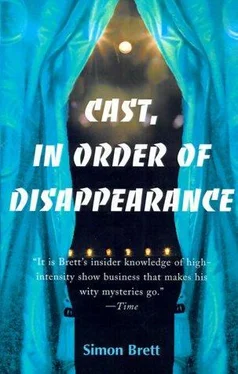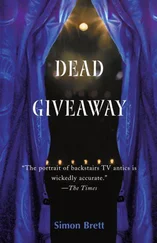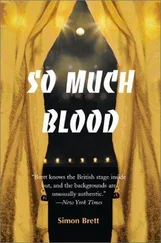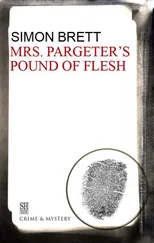Simon Brett - Cast in Order of Disappearance
Здесь есть возможность читать онлайн «Simon Brett - Cast in Order of Disappearance» весь текст электронной книги совершенно бесплатно (целиком полную версию без сокращений). В некоторых случаях можно слушать аудио, скачать через торрент в формате fb2 и присутствует краткое содержание. Жанр: Классический детектив, на английском языке. Описание произведения, (предисловие) а так же отзывы посетителей доступны на портале библиотеки ЛибКат.
- Название:Cast in Order of Disappearance
- Автор:
- Жанр:
- Год:неизвестен
- ISBN:нет данных
- Рейтинг книги:3 / 5. Голосов: 1
-
Избранное:Добавить в избранное
- Отзывы:
-
Ваша оценка:
- 60
- 1
- 2
- 3
- 4
- 5
Cast in Order of Disappearance: краткое содержание, описание и аннотация
Предлагаем к чтению аннотацию, описание, краткое содержание или предисловие (зависит от того, что написал сам автор книги «Cast in Order of Disappearance»). Если вы не нашли необходимую информацию о книге — напишите в комментариях, мы постараемся отыскать её.
Cast in Order of Disappearance — читать онлайн бесплатно полную книгу (весь текст) целиком
Ниже представлен текст книги, разбитый по страницам. Система сохранения места последней прочитанной страницы, позволяет с удобством читать онлайн бесплатно книгу «Cast in Order of Disappearance», без необходимости каждый раз заново искать на чём Вы остановились. Поставьте закладку, и сможете в любой момент перейти на страницу, на которой закончили чтение.
Интервал:
Закладка:
… well, I was worried about you.’
It was the first softening Charles could ever remember hearing from Juliet. It warmed him. ‘Thank you.’
‘Honestly, Daddy, I don’t know what you’re up to half the time. That peculiar phone-call yesterday morning, and now all this. What on earth were you doing in Streatley anyway? I thought you had taken the cab to Reading.’
‘Yes, I know. The thing is, I had to change my plans. It’s all rather involved, but…’ He paused, and all the boiling thoughts inside him strained for an outlet. He had to tell someone. Why not Juliet? ‘Marius Steen is dead.’
‘Yes, I know.’ Her answer was cool and unconcerned.
‘How do you know?’
‘It was on the radio this morning. On the Today programme.’
‘What? How did it say he died?’
‘Heart attack, I think it was. Here’s your coffee.’ As she placed the cup in front of him, Charles looked at his daughter, wondering if she could be involved in this grotesque business. But in her face, as easily read as her mother’s, there was nothing devious; she was telling the truth. ‘Anyway, Daddy, why do you tell me that? Was it Steen you went to see last night?’
‘No.’
‘I didn’t know you knew him.’
‘I didn’t.’ He sipped the coffee. It wasn’t what he needed. His body felt dangerously unstable and bilious. ‘Juliet, could you get me a drop of whisky?’
‘At this time in the morning? Daddy’-with all the awe of a television documentary-are you an alcoholic?’
‘I don’t know. I’ve never thought about it. Where does liking a drink stop and being an alcoholic start?’
‘I should think it starts when you need a hair of the dog the next morning.’ Juliet italicised the unfamiliar phrase.
‘Well, I do need one now.’
‘I don’t know whether I should-’
‘Oh, get it!’ he snapped impatiently. As Juliet scurried shocked to the cocktail cabinet, Charles asked himself whether he was in fact an alcoholic. On balance, he decided he probably wasn’t. He could do without drink. But he wouldn’t like to have to. It was an old joke-a teetotaller knows every morning when he wakes up that that’s the best he’s going to feel all day. Drink at least offers some prospect of things improving.
He felt Juliet’s shocked eyes on him as he poured whisky into his coffee and drank it gratefully. It made him feel more stable, but desperately tired. Waves of relief washed over him. Steen had died of a heart attack. Thoughts of murder had been prompted only by the events of the previous week and the melodramatic circumstances of the discovery of the body. All the contradictory details evaporated. Charles believed what he wanted to believe. The pressure was off. ‘Juliet love, what’s the time?’
‘Twenty past ten.’
‘Look, I think I’ll go back to bed for a bit.’
‘But you must have something to eat.’ Frances’ eternal cry.
‘When have you got to go to work?’
‘Have to leave quarter to two.’
‘Wake me at half-past twelve. Then I’ll have something to eat. I promise.’
It wasn’t until after lunch and Juliet’s departure that Charles remembered about Jacqui, still lying low at Hereford Road. The public announcement of Steen’s death had sapped the urgency out of him and yesterday’s imperatives no longer mattered. Jacqui was just the frayed end of an otherwise completed pattern and it was with reluctance that he dialled his own number.
Jacqui answered. All of the Swedish girls must be out at their various Swedish employments. Her voice was guarded, but not panic-stricken. ‘Charles? I wondered when you were going to ring. I was just about to leave.’
‘Jacqui, I’ve got some bad news…’
‘It’s all right. I heard. On Open House.’
‘What?’
‘The radio.’
‘Ah. Well, I’m sorry.’
‘Thank you.’ There was a pause, and Charles could feel how fiercely she was controlling her emotions.
‘Jacqui, I’m afraid I never got the photos to him.’
‘That hardly matters now, does it? Nothing much matters now.’
‘Jacqui…’
‘I’ll be all right.’
‘Yes. I suppose that’s the end of it, isn’t it?’
‘I wouldn’t count on that.’
‘What do you mean?’ Charles had an unpleasant feeling he was about to sacrifice his recently-won calm.
‘Do you think he died of a heart attack, Charles?’
‘Yes.’
There was a grunt from the other end of the line, a sound between exasperation and despair. ‘Charles, I can’t talk about it now. I’m too
… I’ll talk when-’
‘Tomorrow?’
‘Yes, if I feel OK. Come round when you… Evening. Eight or
…’
‘OK. I’ll be there. Archer Street. You’ll be all right now?’
‘Like hell.’ The phone went dead.
Before Charles left the house in Pangbourne, he took the envelope of photographs out of his inside pocket and looked at them. With Steen’s death they had changed. Already they had the air of curios or souvenirs-oddities from another age. The erotic quality had drained from them and they seemed like sepia prints in an album of someone else’s relations. Mildly interesting, but ultimately irrelevant.
He looked around for somewhere to destroy them. The trouble with architect-designed houses on estates is that they have nothing like an open fire. The central heating was fired by oil. (Miles had already spoken gloomily of the inevitable price rises which the Middle East situation must precipitate. As he said portentously, ‘You know, Pop, the days of cheap fuel are over.’) The cooker was electric. There was no convenient stove to consume the evidence.
Charles took a giant box of matches from the kitchen and went out into the garden. The forty-foot long area was neatly organised. A potting shed of conspicuous new timber, a patio area protected by a screen of latticework bricks, a path of very sane crazy paving winding diagonally across the lawn, a meticulous row of cloches. Only the winter shagginess of the grass gave any hint of rampant nature or humanity.
It had started to rain. Big heavy drops that were cold as they fell, penetrating, on his head and shoulders. In the far corner of the garden Charles saw what he was looking for. Neatly screened by another low wall of lattice-work bricks were a compost heap, bound in by wooden slats, and an empty metal incinerator. He lit the photographs one by one and let the flimsy black rectangles of ash drop into the bin. Finally he burnt the envelope, then stirred the dampening fragments into a black unrecognisable mash.
X
The obituary appeared in The Times the next day, Tuesday 11th December.
MR MARIUS STEEN
Impresario and Showman
Mr Marius Steen, CBE. the impresario, died on Sunday. He was 68. Born in Warsaw in 1905, his full name was Marius Ladislas Steniatowski, but he shortened it for convenience when his parents came to England in 1921. His father was a tailor and for some years the young Steen helped him in his business. But already the attraction of entertainment was strong; Steen spent most of his limited pocket-money on tickets for the music hall and in 1923 launched himself as Mario, the Melodic Whistler. In spite of changes in name and act, he was never a success as a performer, but became increasingly interested in the business of promotion and management. The first act he managed was Herbert and his Horrible Dogs in 1924.
Soon he was progressing from individual acts to the presentation of complete shows. Though he started with wrestling and all-girl revues, by 1930 he was presenting variety bills at music halls all over the country. Through the Thirties he centralised his activities on London and, in 1935, had his first major success with the spectacular revue Go With The Girls. None of these early productions had a great deal to recommend them artistically, but Steen always maintained that success must be measured by public reaction alone. And by that criterion his shows were highly successful.
Читать дальшеИнтервал:
Закладка:
Похожие книги на «Cast in Order of Disappearance»
Представляем Вашему вниманию похожие книги на «Cast in Order of Disappearance» списком для выбора. Мы отобрали схожую по названию и смыслу литературу в надежде предоставить читателям больше вариантов отыскать новые, интересные, ещё непрочитанные произведения.
Обсуждение, отзывы о книге «Cast in Order of Disappearance» и просто собственные мнения читателей. Оставьте ваши комментарии, напишите, что Вы думаете о произведении, его смысле или главных героях. Укажите что конкретно понравилось, а что нет, и почему Вы так считаете.












